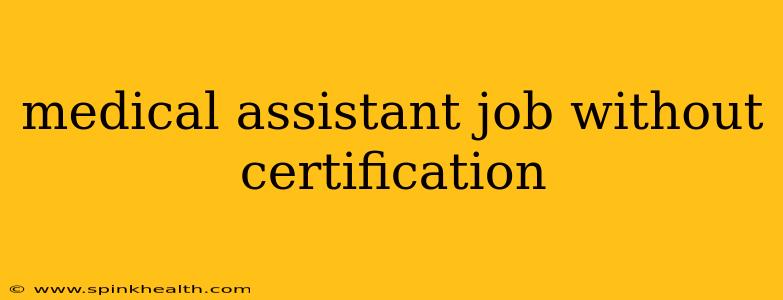Landing a Medical Assistant Job Without Certification: A Realistic Look
The world of healthcare is dynamic, and sometimes, circumstances lead individuals to seek medical assistant positions without the traditional certification. While certification is often preferred and can significantly boost your chances, it's not always a requirement. This article explores the possibilities, challenges, and paths you can take to secure a medical assistant role without formal certification.
Let's be upfront: finding a medical assistant job without certification is more challenging than with it. Many clinics and hospitals prioritize certified MAs due to the standardized training and skill sets they represent. However, it's not impossible. Your success hinges on highlighting transferable skills, demonstrating a strong work ethic, and potentially pursuing alternative routes.
What are the chances of getting a medical assistant job without certification?
Your chances depend significantly on several factors, including your experience, the specific needs of the employer, and the job market in your area. Smaller practices or those experiencing staffing shortages might be more open to hiring individuals without certification, especially if you possess relevant skills.
What skills and experience are highly valued by employers?
Even without certification, you can significantly increase your appeal by showcasing these skills:
- Strong administrative abilities: Proficiency in medical billing, scheduling appointments, managing patient records (electronic health records – EHR experience is a huge plus!), and handling insurance claims is immensely valuable.
- Excellent communication skills: Medical assistants need to interact effectively with patients, doctors, and other staff members. Demonstrating empathy, professionalism, and clear communication is essential.
- Basic medical knowledge: While you lack formal certification, familiarity with medical terminology, procedures, and basic anatomy is advantageous. Any prior experience in a healthcare setting, even in a non-medical assistant role, is beneficial.
- Proficiency in computer software: Mastery of Microsoft Office Suite and experience with EHR systems are highly sought after.
- Attention to detail and organizational skills: Accuracy is paramount in a medical setting. Employers value candidates who demonstrate meticulous attention to detail and excellent organizational skills.
How can I increase my chances of getting hired without certification?
1. Highlight transferable skills: Focus on how your existing skills translate to the demands of a medical assistant position. Have you worked in customer service, administrative roles, or other fields requiring strong communication and organizational skills? Emphasize these transferable abilities in your resume and cover letter.
2. Network strategically: Reach out to your network – friends, family, former colleagues – and inform them of your job search. Networking can lead to unexpected opportunities.
3. Target smaller clinics and practices: Larger healthcare facilities typically prioritize certified MAs. Smaller clinics may be more willing to consider candidates without certification, particularly those with relevant experience.
4. Consider entry-level positions: Starting in an entry-level role, even one not explicitly titled "Medical Assistant," can provide valuable experience that you can use to further your career goals.
5. Offer to work as an apprentice or volunteer: Gaining hands-on experience, even without pay, significantly enhances your chances. This demonstrates your commitment and allows you to learn the ropes under the supervision of experienced professionals.
6. Emphasize your willingness to learn: Express your commitment to continuous professional development and your intention to pursue certification in the future. This shows initiative and dedication.
What are the alternative career paths if I can't find a medical assistant job without certification?
If securing a medical assistant position proves difficult, consider exploring related roles:
- Medical receptionist: This role focuses on administrative tasks and can provide entry into a healthcare setting.
- Patient care technician: These positions offer a blend of administrative and clinical tasks.
- Phlebotomist: Focusing on blood draws, this role provides valuable clinical experience.
Remember, obtaining certification is a great investment in your future career prospects. Even if you secure a position without it initially, actively pursuing certification will significantly improve your long-term career options and earning potential. Don't give up; your journey to a medical assistant career may have a different starting point, but the destination is still achievable.

